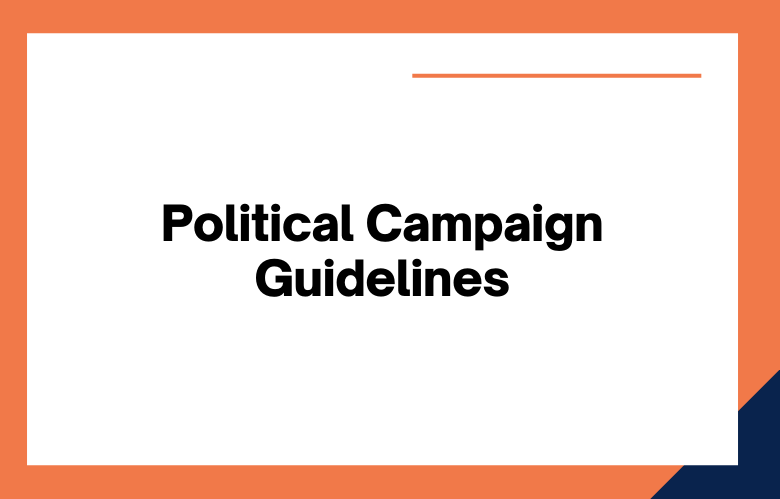As the election season ramps up, campaigns turn to advertise to help get their message out. The ads can effectively reach voters; there are some essential things to remember when creating political campaign ads.
Are you thinking about running a political campaign?
If so, you’ll need to develop an advertising strategy that complies with the rules and regulations set forth by the Federal Election Commission.
We’ll outline the basics of political campaign advertising so that you can make informed decisions about your marketing efforts.
Political Campaign Advertising Guidelines
Political campaign advertising should not be misleading.
No matter what it is, people can fall victim to advertising. A political campaign should be no different.
Don’t use negative and non-substantiated attacks. Use words that positively describe you, your party’s policies, and the opponent. Please don’t make your opponents into caricatures; instead, give them a chance to respond with their message.
There are many dos and don’ts in political campaign advertising. Don’t use threatening language or words that incite violence.
Political campaign advertising is a great way to get the word out about your campaign. However, it’s essential to follow specific guidelines so you don’t run afoul of any election laws.
When political campaigns begin, they must follow specific guidelines for what they can and cannot advertise.
Ads must be truthful and cannot contain false, misleading, or deceptive statements.
Political campaign advertising is expected to be honest and truthful. Candidates are not permitted to knowingly or deliberately make false statements while campaigning. If a political ad contains an inaccurate account, candidates must correct that inaccuracy within 24 hours of the original communication.
Political advertising is a powerful tool for shaping opinion and affecting voters’ choices. Political messages take many forms, from televised advertisements to social media posts; however, all political ads.
Ads must be factually based, and their claims must be substantiated.
Knowingly making false claims against a candidate on TV or radio is illegal. Advertisements should be accurate and truthful.
To avoid bias and inaccurate information, political campaign ads should be identified.
A set of rules and regulations governs political campaign advertising. They are designed to protect the public from false and misleading claims.
To avoid misleading voters, political ads should not use endorsements from people without a connection to the candidate.
- Keep your advertising content professional and fact-based
- Do not make false or misleading statements
- Acknowledge your opponents and their policies honestly
- Refrain from attacking your opponents personally
- Stick to the issues, and avoid mudslinging
- Appeal to people’s emotions, but do so in a responsible way
- Make sure all of your advertising is accurate and up-to-date
- Respect the privacy of individuals
- The tone of voice for your political campaign advertising should be professional and courteous.
- You should never attack or insult your opponent in your ads.
- Make sure that all of your claims are factual and can be substantiated.
- Keep your ads simple and easy to understand.
- Always use correct spelling and grammar in your advertising materials.
- Ensure that the images and videos in your ads are appropriate and respectful.
- Be aware of the target audience for your campaign advertising, and tailor your content accordingly.
- Establish your campaign’s tone of voice
- Create advertising that is truthful and accurate
- Make sure your campaign manager approves all advertising
- Please respect the privacy of individuals and do not use their personal information without consent
- Use good judgment when selecting images and videos to include in your ads
- Always be aware of your audience and what they might find offensive
- Keep your messaging consistent across all platforms
- Understand the advertising laws in your state or country
- Keep your advertising truthful and accurate
- Ensure your campaign manager or another authorized individual approves all advertising.
- Do not make any false statements about your opponents
- Avoid using scare tactics or making unsubstantiated claims
- Respect the privacy of individuals- do not use their personal information without consent
- Retain copies of all advertising material for review
- Keep your advertising content professional and fact-based
- Do not attack or slander your opponent
- Focus on your campaign and policies, not your opponent’s
- Make sure all advertising materials are accurate
- Avoid making any promises you can’t keep
- Always be respectful to your opponents and their supporters
- Stick to the facts, avoid hyperbole or exaggeration
- Proofread all advertising materials before releasing them to the public
- Establish your campaign’s tone of voice
- Create a style guide to ensure all advertising is consistent
- Make sure all visuals are high-quality and accurate
- Do not make false or misleading statements
- Respect the privacy of individuals
- Only use approved logos and trademarks
- Avoid offensive or inflammatory language
- Stick to the facts
- The tone of voice for all political campaign advertising must be professional.
- All advertisements must be factually accurate.
- Advertisements cannot contain misleading or deceptive statements
- Promotions cannot make unsubstantiated claims
- Ads must identify the sponsor
- Establish your campaign’s tone of voice
- Create advertising that is truthful and accurate
- Make sure your advertising is respectful and does not attack your opponent
- Make sure your campaign team approves all advertising before the release
- Please keep track of where your ads are being placed and how much you’re spending on them
- Always be respectful and polite when speaking about your opponent
- Never make false statements about your opponent
- Do not attack your opponent’s character or record
- Stick to the issues- do not get sidetracked by personal attacks
- Keep your advertising focused on the voters, not on yourself
- Make sure all of your advertising is accurate and truthful
- Avoid negative campaigning whenever possible
- Respect voters’ privacy- do not reveal any information about them without their permission.
- Establish your campaign’s tone of voice and stick to it
- Make sure all advertising is accurate and truthful
- Keep your ads simple, clear, and easy to understand
- Avoid negative campaigning
- Don’t make promises you can’t keep
- Respect the privacy of individuals
- Only use approved images and videos
- Don’t break the law.
Conclusion
Political advertising is a complex and nuanced endeavor. Contact us today if you’re looking for help crafting your campaign messaging.
Our team has experience in political campaigning, from TV ads to social media outreach.
We can help get your message out there and win over voters.
One way to get in touch is by filling out our online form on this site or give us a call at
+91 9848321284. Let’s work together today!











